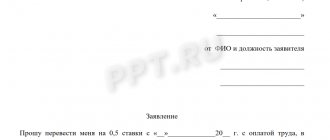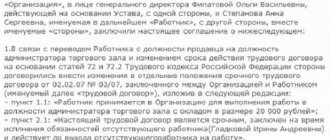Urgent or not
As a general rule, employment contracts are concluded for an indefinite period – that is, they are valid until terminated at the request of the employee or employer. A contract for a predetermined period (fixed-term employment contract) can be concluded only if this is provided for in the Labor Code of the Russian Federation.
An employment agreement with the head of an organization may be fixed-term. This is provided for in Art. 59 of the Labor Code. In addition to the manager, a fixed-term contract can be concluded with the deputy manager and chief accountant. This is explained by the important role of the organization’s leaders and the tasks assigned to them - not just to work, but to manage the business so that it makes a profit.
Such an agreement can be concluded with the head of any organization - LLC, JSC, municipal unitary enterprise, cooperative, etc. (Part 2 of Article 59 of the Labor Code of the Russian Federation).
Expert opinion
Labor Lawyer Olga Smirnova
It is not necessary to limit the validity of the agreement to a specific period. You can also conclude an ordinary open-ended employment contract with the director. The decision on whether the contract will be fixed-term or indefinite is made by the founders of the organization.
Urgent or indefinite?
When preparing documents with the general director, it is important to choose a fixed-term or open-ended employment contract. There is no specific option: the choice is determined by the specificity of the organization and its legal documents.
In Part 2 of Art. 59 of the Labor Code of the Russian Federation spells out possible options for concluding a fixed-term contract with a manager. But this is regulated in several aspects:
- if the company's Charter specifies the duration of powers, upon completion of which he is replaced or re-elected;
- in the event of an agreement by the board of directors of the joint-stock company to hire a manager on a competitive basis after each certain period.
If any of the listed principles is absent, then the contract is concluded on an indefinite basis.
How to determine the period for which a contract can be concluded
The term of office of the general director is established in the organization's charter. In addition, the period must be specified in the employment contract with the director. Depending on the type of organization, the term of appointment may be set by the founders or the board of directors.
OOO
The founders of a limited liability company elect a general director for the period established by the charter. The appointment may fall within the competence of the board of directors, if there is one in the company (clause 1, article 40 of the Federal Law of February 8, 1998 No. 14-FZ “On Limited Liability Companies”). The decisions made are documented in the minutes of the general meeting of participants. If there is only one participant in the company, instead of the protocol, he can sign the decision (the difference between these documents is that in order to make a written decision, it is not necessary to convene a general meeting of participants according to the procedure established by law).
JSC
Similar rules apply in joint stock companies. The term of office of the general director is determined in the constituent documents. The director is appointed by the general meeting of shareholders, the board of directors or the supervisory board (Article 69 of Federal Law No. 208-FZ of December 26, 1995 “On Joint-Stock Companies”).
State unitary enterprise or municipal unitary enterprise
The head of a unitary enterprise is appointed to the position by the owner of the property of a state unitary enterprise or municipal unitary enterprise (Article 21 of the Federal Law of November 14, 2002 No. 161-FZ “On State and Municipal Unitary Enterprises”. A representative of the state or municipal body to which the unitary enterprise is accountable acts on his behalf.
HOA and TSN
According to Article 149 of the Housing Code of the Russian Federation, the chairman of the board of a homeowners' association is elected by the members of the board. The term of his office is determined by the charter of the HOA. Similar rules for appointing a manager for a certain period of time apply in real estate owners' partnerships (TSN).
Production cooperative
In a production cooperative, the term of office of the manager (chairman) is established by the charter of the cooperative. A director can be appointed by both the general meeting of members of the cooperative and the supervisory board, depending on what is provided for in the charter (Article 17 of Federal Law No. 41-FZ of May 8, 1996 “On Production Cooperatives”).
Agricultural cooperative
The chairman of an agricultural cooperative is elected for a term of no more than five years by the general meeting of members of the cooperative (Article 26 of the Federal Law of December 8, 1995 No. 193-FZ “On Agricultural Cooperation”).
Is it possible to conclude an open-ended employment contract with the general director?
Olya, the norm is new, as you clarified, theoretically, I found someone who should do this, but in practice, I think it will be more difficult, try it, maybe someone here on the site has already had experience in holding a participant accountable. You still need to pay attention to equity participation.
In Part 11 of Art. 15.23.1 of the new edition of the Code of Administrative Offenses of the Russian Federation establishes sanctions for violation of the requirements of the legislation of the Russian Federation on the procedure for preparing and holding general meetings of LLC participants.
In accordance with Part 1 of Art. 91 Civil Code of the Russian Federation, Part 1, Art. 32 of Law No. 14-FZ, the general meeting of LLC participants is its highest body. The general meeting of LLC participants can be regular or extraordinary. All LLC participants have the right to attend the general meeting of LLC participants, take part in the discussion of agenda items and vote when decisions are made. The provisions of the constituent documents of the LLC or decisions of the LLC bodies that limit the specified rights of the company's participants are void. Each LLC participant has at the general meeting of participants a number of votes proportional to his share in the authorized capital of the company, with the exception of cases provided for by Federal Law No. 14-FZ of February 8, 1998 “On Limited Liability Companies.” The rules governing the procedure for preparing and holding a general meeting of LLC participants are established in Art. Art. 33 - 39 of Law No. 14-FZ.
In accordance with Part 11 of Art. 15.23.1 of the Code of Administrative Offenses of the Russian Federation, an illegal refusal to convene or evasion of convening a general meeting of LLC participants, as well as violation of the requirements of federal laws for the procedure for convening, preparing and holding general meetings of LLC participants, entails the imposition of an administrative fine in the following amounts: for citizens - in the amount of 2 thousand to 4 thousand rubles; for officials - from 20 thousand to 30 thousand rubles; for legal entities - from 500 thousand to 700 thousand rubles.
As follows from paragraphs. 61 clause 2 art. 28.3 of the Code of Administrative Offenses of the Russian Federation, draw up protocols on administrative offenses provided for in Part 11 of Art. 15.23.1 of the Code of Administrative Offenses of the Russian Federation, officials of bodies authorized in the field of financial markets have the right.
According to the Regulations on the Federal Financial Markets Service of Russia, approved. By Decree of the Government of the Russian Federation of June 30, 2004 N 317 (hereinafter referred to as the Regulations on the FFMS of Russia), the federal executive body authorized in the field of financial markets (with the exception of insurance, banking and auditing activities) is currently the FSFM of Russia.
In turn, clause 4 of the Regulations on the FFMS of Russia establishes that the FSFM of Russia carries out its activities directly and through its territorial bodies (RO FSFM of Russia). Thus, today the bodies authorized in the field of financial markets are the FSFM of Russia and the RO FSFM of Russia. Accordingly, draw up protocols on offenses provided for in Part 11 of Art. 15.23.1 Code of Administrative Offenses of the Russian Federation, authorized by officials of the FSFM of Russia and RO FSFM of Russia.
The list of officials of the Federal Financial Markets Service of Russia authorized to draw up protocols on administrative offenses in the field of financial markets (with the exception of insurance, banking and auditing activities) is established by Order of the Federal Financial Markets Service of Russia dated August 25, 2004 N 04-391/pz-n. These include: the head of the department for organizing and conducting supervisory activities on the securities market, his deputies; head of the department for regulating the activities of professional participants and infrastructure organizations in the financial market, his deputies; Head of the Department for Regulation of Issue and Circulation of Equity Securities, his deputies; Head of the Department for Regulation and Control of Collective Investments, his deputies; heads of departments for organizing and conducting supervisory activities on the securities market, their deputies - in case of appointment by order of the Federal Financial Markets Service of Russia as the head of a group of inspectors; Head of the Information and Financial Market Monitoring Department and his deputies; other officials of the Federal Financial Markets Service of Russia, specially authorized by its order to exercise control over compliance with legislation in the field of financial markets (with the exception of insurance, banking and auditing activities).
The list of officials of the Federal Financial Markets Service of Russia authorized to draw up protocols on administrative offenses in the field of financial markets (with the exception of insurance, banking and auditing activities) is determined by Order of the Federal Financial Markets Service of Russia dated November 12, 2004 N 04-936/pz-n. These include: heads of the Federal Financial Markets Service of Russia, their deputies; heads of departments of the Federal Financial Markets Service of Russia, their deputies; other officials of the Federal Financial Markets Service of Russia, specially authorized by their orders to monitor compliance with legislation in the field of financial markets (with the exception of insurance, banking and auditing activities).
In accordance with Part 1 of Art. 28.1 of the Code of Administrative Offenses of the Russian Federation, the reasons for the initiation by authorized persons of the FSFM of Russia (RO FSFM of Russia) of cases of administrative violation of the legislation of the Russian Federation on limited liability companies are: direct discovery by officials of the FSFM of Russia (RO FSFM of Russia) of sufficient data indicating the existence of an event of an administrative offense; materials received by the FFMS of Russia (RO FFMS of Russia) from law enforcement agencies, as well as from other state bodies, local government bodies, and public associations containing data indicating the existence of an administrative offense event; messages and statements of individuals and legal entities, as well as messages in the media containing data indicating the existence of an administrative offense event.
According to Part 3 of Art. 28.1 of the Code of Administrative Offenses of the Russian Federation, a case of an administrative violation of the legislation of the Russian Federation on LLC can be initiated by an official of the Federal Financial Markets Service of Russia (RO Federal Financial Markets Service of Russia) only if there is at least one of the above reasons and sufficient data indicating the presence of an administrative violation event.
In practice, a violation of the legislation of the Russian Federation on LLCs can be detected by the FSFM of Russia (RO FSFM of Russia) only during the implementation of control and supervisory measures in the established field of activity, i.e. during inspections of organizations, control and supervision of which is entrusted to the FSFM of Russia (RO FSFM of Russia). The list of such organizations is established in the Regulations on conducting inspections of organizations, the control and supervision of which is entrusted to the Federal Financial Markets Service of Russia, approved. By Order of the Federal Financial Markets Service of the Russian Federation of November 13, 2007 N 07-108/pz-n.
Maximum term
Labor Code in Part 1 of Art. 58 establishes that a fixed-term employment contract can be concluded for no more than 5 years (except for those cases when otherwise provided by a special law). For the head of an organization, none of the laws directly states the possibility of concluding an employment contract for a period of more than 5 years.
Therefore, it would be correct to limit the term of office of the general director to 5 years, and to appoint him to this position for the same period. If an employment contract is concluded for a period of more than 5 years, there is a risk that the court will recognize it as concluded for an indefinite period.
If appointed for a period other than that specified in the charter
The company's charter may determine the director's term of office in different ways:
- The General Director is appointed for a period of no more than 2 years.
In this case, the exact period is determined in the decision on the appointment of the general director to the position. It can be equal to two or one and a half years, a year, etc.
- The General Director is elected for a term of 2 years.
If there is such wording in the constituent documents, the director must be appointed for two years. The law does not provide for any fines or sanctions for his appointment for a period other than that established by the charter. However, such a discrepancy in terms will raise questions among the company’s counterparties about the legality of the director’s powers.
- The General Director is appointed for an indefinite period.
If the charter contains such a provision, a fixed-term employment contract cannot be concluded with the director. But owners or shareholders can change the charter and provide for a certain term of office. After this, it will be possible to conclude a fixed-term employment contract with the director.
Duration of the employment contract
The duration of the agreement to hire the head of a limited liability company (LLC) can be fixed or indefinite. An open-ended contract is concluded if the organization’s charter does not provide for acts fixing the duration of the general director’s tenure in office.
A fixed-term agreement is used when the period of election to a position is reflected in the constituent documents of the enterprise or in an agreement drawn up by the board of the company. The duration of a fixed-term agreement, according to Article 58 of the Labor Code, cannot exceed five years.
IMPORTANT! If the local acts of the organization indicate the maximum possible term in the post of manager, you need to follow it. However, it cannot exceed the five years established by law.
Preparation of other documents
Enrollment in labor
The head of the organization, like any other employee, provides the employer with a work book for making entries about work, incentives, penalties, etc. Entries are made in the usual manner, with one exception. In the fourth column of the work book, “Name, date and number of the document on the basis of which the entry was made,” you must indicate the basis for hiring. In the case of the general director, you can enter in this column:
- the name, date and number of the decision, protocol or other similar document by which the director was appointed to the position; or
- date and number of the employment order.
This filling procedure is confirmed by Letter of Rostrud dated September 22, 2010 No. 2894-6-1, as well as clause 3.1. Instructions for filling out work books, approved by Resolution of the Ministry of Labor of October 10, 2003 No. 69.
The order of acceptance to work
An order for hiring a manager under a fixed-term employment contract is drawn up according to a unified form No. T-1, approved by Resolution of the State Statistics Committee of Russia dated January 5, 2004 No. 1, or according to another form that the organization has developed itself.
The order specifies:
- name, date and number of the decision on the appointment of the manager;
- date and number of the contract;
- FULL NAME. hired general director;
- the name of the structural unit established in accordance with the organizational structure - “directorate”, “head office”, etc.;
- job title – “General Director”, “President”, “Director”, “Head of the organization”;
- salary;
- probationary period, if established.
The appointed general director signs the employment order:
- and on behalf of the employer;
- and for himself personally (he signs that he is familiar with the contents of the order).
Entering information into the Unified State Register of Legal Entities
Within 3 days after the decision on appointment to the position is made, information about the new general director must be submitted to the Unified State Register of Legal Entities through the tax authority that registers organizations in a particular region, or through the MFC.
Employment contract with the General Director (indefinite; without trial)
EMPLOYMENT CONTRACT with the General Director (general form; unlimited; without trial)
g. ________________
“___”_________ ____ g.
__________________, hereinafter referred to as the “Company”, represented by __________________, acting___ on the basis of __________________, on the one hand, and __________________, hereinafter referred to as the “Employee”, on the other hand, have entered into this agreement as follows:
SUBJECT OF THE EMPLOYMENT AGREEMENT
1.1. The employee is appointed to the position of General Director ________ based on the decision of ________ (Minutes No. ____ dated “___”________ ___).
1.2. Work in the Company is the main one for the Employee. An employee may hold other paid positions in other organizations only with the permission of the authorized body of the Company.
1.3. The employee is obliged to start work from “___”________ ____.
1.4. This employment contract is concluded for an indefinite period and comes into force from the moment it is signed by both parties.
1.5. The Employee’s place of work is _______________ at the address: _______________________.
DUTIES OF THE PARTIES
2.1. The Company entrusts, and the Employee assumes, management of the current activities of the Company for the period of validity of this agreement.
2.2. The employee independently resolves all issues of the Company's activities within his competence by this agreement, the Company's Charter, job description, decisions of the General Meeting of Shareholders/Participants and the Board of Directors, as well as the current legislation of the Russian Federation.
2.3. The employee is accountable to the Board of Directors of the Company and the General Meeting of Shareholders/Members of the Company. In cases provided for by the contract, as well as the current legislation of the Russian Federation, the Employee may be relieved of his position by decision of the General Meeting.
2.4. The employee is required to perform the following job duties:
— manage, in accordance with the current legislation of the Russian Federation, the production, economic and financial-economic activities of the Company, bearing full responsibility for the consequences of decisions made, the safety and effective use of the Company’s property, as well as the financial and economic results of its activities;
— organize the work and effective interaction of all structural divisions, workshops and production units, direct their activities towards the development and improvement of production, taking into account social and market priorities, increasing the efficiency of the Company, increasing sales volumes and increasing profits, quality and competitiveness of manufactured products, its compliance with international standards in order to conquer the domestic and foreign markets and meet the needs of the population for relevant types of domestic products;
— ensure that the Company fulfills all obligations to the federal, regional and local budgets, state extra-budgetary funds, suppliers, customers and creditors, including bank institutions, as well as economic and labor contracts and business plans;
— organize production and economic activities based on the widespread use of the latest equipment and technology, progressive forms of management and labor organization, scientifically based standards of material, financial and labor costs, studying market conditions and best practices (domestic and foreign) in order to fully improve the technical level and quality of products (services), economic efficiency of their production, rational use of production reserves and economical use of all types of resources;
— take measures to provide the Company with qualified personnel, rational use and development of their professional knowledge and experience, creation of safe and favorable working conditions for life and health, compliance with environmental protection legislation;
- ensure the correct combination of economic and administrative methods of management, unity of command and collegiality in the discussion and resolution of issues, material and moral incentives for increasing production efficiency, application of the principle of material interest and responsibility of each employee for the work assigned to him and the results of the work of the entire team, payment of wages as established deadlines;
— together with the workforce and the trade union organization of the Company, ensure, based on the principles of social partnership, the development, conclusion and implementation of a collective agreement, compliance with labor and production discipline, promote the development of labor motivation, initiative and activity of the Company’s employees;
— resolve issues related to the financial, economic and production activities of the Company, within the limits of the rights granted to it by law, entrust the management of certain areas of activity to other officials - deputy directors, heads of production units and branches of the Company, as well as functional and production divisions;
— ensure compliance with the rule of law in the activities of the Company and the implementation of economic relations, the use of legal means for financial management and functioning in market conditions, strengthening contractual and financial discipline, regulating social and labor relations, ensuring the investment attractiveness of the Company in order to maintain and expand the scale of business activity ;
— protect the property interests of the Company in court, arbitration, and government bodies.
2.5. The employee has the right:
— without a power of attorney, act on behalf of the Company, including representing its interests and making transactions;
— issue powers of attorney for the right of representation on behalf of the Company, including powers of attorney with the right of substitution;
— dispose of the property and funds of the Company within the limits established by the Charter of the Company and the current legislation of the Russian Federation;
— approve the rules, procedures and other internal documents of the Company, determine the organizational structure of the Company, with the exception of documents approved by the General Meeting of Shareholders/Members of the Company;
— issue orders and give instructions that are binding on all employees of the Company;
— approve the staffing table of the Company, branches and representative offices;
— hire and fire employees, including appointing and dismissing their deputies, chief accountant, heads of departments, branches and representative offices;
— encourage the Company’s employees, as well as impose penalties on them;
— open settlement, currency and other accounts of the Company in banks, enter into agreements and make other transactions;
— approve contract prices for products and tariffs for services;
— organize accounting and reporting;
— submit the annual report and balance sheet of the Company for approval by the General Meeting of Shareholders/Members of the Company;
— organize the preparation and holding of General Meetings of shareholders/members of the Company;
— sign outgoing and payment documents;
— exercise other powers within its competence.
2.6. The employee is also obliged:
— comply with the terms of this agreement, the provisions of the Company’s Charter, as well as the current legislation of the Russian Federation;
— ensure compliance with the Company’s economic activity indicators;
— carry out day-to-day management of the Company’s activities;
— control the work and ensure effective interaction of departments and other services of the Company;
— insure property;
— take measures to eliminate the causes and conditions that may lead to a conflict situation in the team;
— organize compliance with labor discipline and safety regulations;
— properly organize the work of employees;
— create conditions for increased labor productivity;
— improve the working and living conditions of workers;
— provide reports on its activities at the request of the Board of Directors, as well as submit an annual report on its activities at each annual General Meeting of Shareholders/Members of the Company;
— observe the Company’s commercial secrets and take measures to ensure its protection, in connection with which he is obliged not to give interviews, not to hold meetings and negotiations related to the Company’s activities;
— ensure timely payment of taxes in the manner and amount determined by the legislation of the Russian Federation;
— organize the keeping of minutes of meetings of the Management Board and unimpeded access to them for the Company’s shareholders;
— perform other duties related to the implementation of his competence.
2.7. The employee is obliged to comply with the internal labor regulations established by the Company, production and financial discipline, and conscientiously perform his job duties specified in clause 2.4 of this employment contract.
2.8. The Company undertakes:
2.8.1. Provide the Employee with work in accordance with the terms of this employment contract. The Company has the right to require the Employee to perform duties (work) not stipulated by this employment contract only in cases provided for by the labor legislation of the Russian Federation.
2.8.2. Ensure safe working conditions in accordance with the requirements of safety regulations and labor legislation of the Russian Federation.
2.8.3. Pay bonuses and remunerations in the manner and on the terms established by the Company, provide financial assistance taking into account the assessment of the Employee’s personal labor participation in the work of the Company in the manner established by the Regulations on remuneration in the Company and other local acts of the Company.
2.8.4. Carry out compulsory social insurance for the Employee in accordance with the current legislation of the Russian Federation.
2.8.5. Pay for training, if necessary, in order to improve the Employee’s qualifications.
2.8.6. Familiarize the Employee with labor protection requirements and Internal Labor Regulations, provisions of local regulations related to the employee’s performance of his work activities.
2.9. The company has the right:
2.9.1. Terminate the contract with the Employee in the manner and under the conditions established by the current labor legislation of the Russian Federation.
2.9.2. Encourage the Employee for conscientious and effective work.
2.9.3. Demand that the Employee fulfill his job duties and take care of the property of the employer and other employees, and comply with the Company’s internal labor regulations.
2.9.4. Bring the Employee to disciplinary and financial liability in the manner established by the current labor legislation of the Russian Federation.
2.9.5. Conduct certification of the Employee in accordance with the Certification Regulations in order to identify the real level of professional competence of the Employee.
2.9.6. Conduct an assessment of the Employee’s performance in accordance with the Regulations on Labor Performance Assessment.
2.9.7. With the consent of the Employee, involve him in the performance of certain tasks that are not part of the Employee’s job responsibilities.
2.9.8. With the consent of the Employee, involve him in performing additional work in a different or the same profession (position) for an additional fee.
2.9.9. Adopt local regulations.
CONDITIONS OF PAYMENT FOR EMPLOYEES
3.1. For the performance of labor duties, the Employee is set an official salary in the amount of ____ (__________) rubles per month.
3.2. The Company establishes incentive and compensation payments (additional payments, allowances, bonuses, etc.). The amounts and conditions of such payments are determined in the Regulations on bonus payments to employees “______________”, which the Employee was familiarized with when signing this agreement.
3.3. If the Employee, along with his main job, performs additional work in another position or performs the duties of a temporarily absent employee without being released from his main job, the Employee is paid an additional payment in the amount established by an additional agreement of the parties.
3.4. Overtime work is paid for the first two hours of work at time and a half, for subsequent hours - at double rate. At the Employee's request, overtime work, instead of increased pay, may be compensated by providing additional rest time, but not less than the time worked overtime.
3.5. Work on a day off or a non-working holiday is paid in the amount of a single part of the official salary per day or hour of work in excess of the official salary, if work on a day off or a non-working holiday was carried out within the monthly standard working time, and in the amount of a double part of the official salary per day or hour work in excess of the official salary, if the work was performed in excess of the monthly working hours. At the request of an Employee who worked on a day off or a non-working holiday, he may be given another day of rest. In this case, work on a weekend or a non-working holiday is paid in a single amount, and a day of rest is not subject to payment.
3.6. The Employee's wages are paid by issuing cash at the Company's cash desk (by transferring to the Employee's bank account) every six months on the day established by the Internal Labor Regulations.
3.7. Deductions may be made from the Employee's salary in cases provided for by the legislation of the Russian Federation.
VACATION. WORKING AND REST TIME MODE <1>
4.1. The employee has a five-day work week with two days off - _________________ <1>.
4.2. Start time: ____________________ <1>.
Closing time: __________________ <1>.
4.3. During the working day, the Employee is given a break for rest and food from ____ hour to ____ hour, which is not included in working hours <1>.
4.4. The employee is granted annual paid leave of ___ (at least 28) calendar days.
The right to use vacation for the first year of work arises for the Employee after six months of his continuous work in this Company. By agreement of the parties, paid leave may be provided to the Employee before the expiration of six months. Vacation for the second and subsequent years of work can be granted at any time of the working year in accordance with the vacation schedule.
4.5. For family reasons and other valid reasons, the Employee, on the basis of his written application, may be granted leave without pay for the duration established by the labor legislation of the Russian Federation and the Internal Labor Regulations “_____________”.
EMPLOYEE SOCIAL INSURANCE
5.1. The employee is subject to social insurance in the manner and under the conditions established by the current legislation of the Russian Federation.
GUARANTEES AND COMPENSATIONS
6.1. During the period of validity of this agreement, the Employee is subject to all guarantees and compensations provided for by the labor legislation of the Russian Federation, local regulations of the Company and this agreement.
RESPONSIBILITY OF THE PARTIES
7.1. In case of failure or improper performance by the Employee of his duties specified in this agreement, violation of labor legislation, the Employer’s internal labor regulations, other local regulations of the Employer, as well as causing material damage to the Employer, he bears disciplinary, material and other liability in accordance with the labor legislation of the Russian Federation. The calculation of the Employer's losses in the event of material damage caused to him by the Employee is carried out in accordance with the norms provided for by civil law.
7.2. The Employer bears financial and other liability to the Employee in accordance with the current legislation of the Russian Federation.
7.3. The financial liability of a party to a contract arises for damage caused by it to the other party to the contract as a result of its culpable unlawful behavior.
7.4. In cases provided for by law, the Employer is obliged to compensate the Employee for moral damage caused by unlawful actions and/or inaction of the Employer.
7.5. Each party is required to prove the amount of damage caused.
TERMINATION OF THE AGREEMENT
8.1. The grounds for termination of this employment contract are:
8.1.1. Agreement of the parties.
8.1.2. Termination of an employment contract at the initiative of the Employee. In this case, the Employee is obliged to notify the Employer no later than one month before the expected date of termination of this agreement. The specified period begins the next day after the Employer receives the Employee’s resignation letter.
8.1.3. Termination of an employment contract at the initiative of the Employer.
8.1.4. Other grounds provided for by the labor legislation of the Russian Federation.
8.2. The day of termination of the employment contract in all cases is the Employee’s last day of work, with the exception of cases where the Employee did not actually work, but retained his place of work (position).
8.3. The Employer has the right to decide to make a compensation payment to the Employee in the amount of ___________ in the case of ____________________.
8.4. Additional grounds for termination of an employment contract are:
1) in connection with the removal of the head of the organization - the debtor in accordance with the legislation on insolvency (bankruptcy);
2) in connection with the adoption by the authorized body of a legal entity, or the owner of the organization’s property, or a person (body) authorized by the owner of a decision to terminate the employment contract <2>.
FINAL PROVISIONS
9.1. The terms of this employment contract are confidential and are not subject to disclosure.
9.2. The terms of this employment contract are legally binding on the parties from the moment it is signed by the parties. All changes and additions to this employment contract are formalized by a bilateral written agreement.
9.3. Disputes between the parties arising during the execution of an employment contract are considered in the manner established by the current legislation of the Russian Federation.
9.4. In all other respects that are not provided for in this employment contract, the parties are guided by the legislation of the Russian Federation governing labor relations.
9.5. The Agreement is drawn up in two copies having equal legal force, one of which is kept by the Company, and the other by the Employee.
9.6. Before signing the employment contract, the Employee is familiar with the following documents:
_________________________
_________________________
_________________________
ADDRESSES AND DETAILS OF THE PARTIES
Company: ___________________________________________________, address: __________________________________________________________, TIN _____________________________, checkpoint __________________________, settlement account ______________________________ in __________________________, BIC _____________________________. Employee: ___________________________________________________, passport: series _________ N __________, issued by _____________________ _________________________________________ “___”__________ ___ city, department code _____, registered at the address: ___________ _________________________________________________________________. SIGNATURES OF THE PARTIES Company: Employee: ______________/____________ ______________/_____________ M.P. A copy was received and signed by Employee “___”___________ ____. Employee’s signature: ____________________
———————————
<1> These provisions are included if for a given Employee the working time and rest time regime differs from the general rules in force for this Employer.
<2> In accordance with Art. 278 of the Labor Code of the Russian Federation, the decision to terminate an employment contract on the specified basis in relation to the head of a unitary enterprise is made by the body authorized by the owner of the unitary enterprise in the manner established by the Government of the Russian Federation. Also in accordance with Art. 279 of the Civil Code of the Russian Federation, in the event of termination of an employment contract on the specified basis in the absence of guilty actions (inaction) of the Employee, he is paid compensation in the amount determined by the employment contract, but not less than three times the average monthly salary.
How to fire a CEO after his term expires
Despite the limited term of office of a fixed-term employment contract, after its expiration the dismissal of the general director does not occur automatically. In order to correctly terminate a fixed-term contract, the following steps must be taken:
- a notice is issued to the director about the termination of a fixed-term employment contract due to the expiration of its term, which is handed over against signature;
- An entry is made in the work book about the dismissal from the position of the General Director and his new appointment. The basis is the decision of the founder or participant of the organization;
- an order is issued to dismiss the general director due to the expiration of the term of office (you can use form T-8, which was approved by Resolution of the State Statistics Committee of Russia dated January 5, 2004 No. 1, or the organization’s own form;
How to renew an agreement with a director
The extension of the employment relationship with the manager is carried out by appointing him for a new term. Simply extending a fixed-term employment contract is incorrect, since the organization’s charter provides for a limited term of office for the general director (otherwise such a fixed-term employment contract would not have been concluded).
When extending an agreement, it may be recognized as indefinite if the extension was carried out several times and the total term of the employment relationship exceeded 5 years (clause 14 of the Resolution of the Plenum of the Supreme Court of the Russian Federation of March 17, 2004 No. 2 “On the application by the courts of the Russian Federation of the Labor Code of the Russian Federation”).
To extend the powers of a director for a new term, a decision by the sole participant on reappointment to the position is required. Based on it:
- documents on termination of powers are drawn up as in the case of a change of general director;
- then an order for new employment must be issued (see above), and a new fixed-term or indefinite agreement must be concluded.
If the same general director remains for a new term, information about this does not need to be submitted to the tax authority. In accordance with the law, it is necessary to update the Unified State Register of Legal Entities data only when the general director is replaced by a new person.
The employment contract with the director is unlimited
Anna.
The list of cases when a FIXED-TERM employment contract can be signed is clearly stated in Article 59 of the Labor Code of the Russian Federation:
A fixed-term employment contract is concluded: for the duration of the performance of the duties of an absent employee, who, in accordance with labor legislation and other regulatory legal acts containing labor law norms, a collective agreement, agreements, local regulations, and an employment contract, retains his place of work; for the duration of temporary (up to two months) work; to perform seasonal work, when, due to natural conditions, work can only be carried out during a certain period (season); with persons sent to work abroad; for carrying out work that goes beyond the normal activities of the employer (reconstruction, installation, commissioning and other work), as well as work related to a deliberately temporary (up to one year) expansion of production or the volume of services provided; with persons entering work in organizations created for a predetermined period or to perform a predetermined job; with persons hired to perform obviously defined work in cases where its completion cannot be determined by a specific date; to perform work directly related to the internship and professional training of the employee; in cases of election for a certain period to an elected body or to an elective position for paid work, as well as employment related to the direct support of the activities of members of elected bodies or officials in state authorities and local self-government bodies, in political parties and other public associations; with persons sent by employment services to temporary work and public works; with citizens sent to perform alternative civil service; in other cases provided for by this Code or other federal laws.
By agreement of the parties, a fixed-term employment contract can be concluded: with persons entering work for employers - small businesses (including individual entrepreneurs), the number of employees of which does not exceed 35 people (in the field of retail trade and consumer services - 20 people); with age pensioners entering work, as well as with persons who, for health reasons, in accordance with a medical certificate issued in the manner established by federal laws and other regulatory legal acts of the Russian Federation, are allowed to work exclusively of a temporary nature; with persons entering work in organizations located in the Far North and equivalent areas, if this is related to moving to the place of work; to carry out urgent work to prevent disasters, accidents, accidents, epidemics, epizootics, as well as to eliminate the consequences of these and other emergency circumstances; with persons elected through a competition to fill the relevant position, conducted in the manner established by labor legislation and other regulatory legal acts containing labor law norms; with creative workers of the media, cinematography organizations, theaters, theatrical and concert organizations, circuses and other persons involved in the creation and (or) performance (exhibition) of works, in accordance with the lists of works, professions, positions of these workers, approved by the Government of the Russian Federation Federation, taking into account the opinion of the Russian Tripartite Commission for the Regulation of Social and Labor Relations; with managers, deputy managers and chief accountants of organizations, regardless of their legal forms and forms of ownership; with persons studying full-time; with persons applying for part-time work; in other cases provided for by this Code or other federal laws.
If the deadline has expired and a new director has not been appointed
Corporate law establishes that the powers of the CEO continue until a new person is appointed to this position, so as not to leave the organization without leadership. For joint stock companies, this rule is established by Art. 69 of the Federal Law “On Joint Stock Companies”, for other legal entities it can be applied by analogy.
But from the point of view of labor legislation, such a situation may mean extending the employment relationship with the general director for an unlimited period. According to Art. 58 of the Labor Code, if the employee continues to work after the expiration of the term, the agreement with him can be recognized as unlimited. Therefore, it is necessary to prepare documents for the reappointment of the general director under a fixed-term employment contract in a timely manner.
Acting – is it possible to conclude a fixed-term contract?
A fixed-term employment contract with the acting general director is not provided for by law. Therefore, if there is no confidence that the candidate will cope with the management of the organization, you can set him on a probationary period or appoint him to the position of manager and release him from it if problems arise. The right of the founder to terminate the employment contract with the head of the organization early is provided for in paragraphs. 2 p. 1 art. 278 Labor Code of the Russian Federation.
Expert opinion
Labor Lawyer Olga Smirnova
It is wrong to appoint an acting CEO for a period before the appointment of the “main” CEO. The courts recognize the period established in this way as inconsistent with the Labor Code, as ending with the occurrence of an event (Article 58 of the Labor Code of the Russian Federation). As a result, the VRIO will be recognized as appointed for an indefinite period (see, for example, Determination of the Moscow City Court dated June 7, 2012 No. 4g/8-4383).
Useful video
Two points of view on the employment contract of the founding manager. Should a manager who is the sole founder of an organization have an employment contract and receive a salary:
An employment contract with a director is a standard agreement on general conditions determined by the Labor Code of the Russian Federation. However, nuances arise in the work when the director and employee are the same person.
The legislation does not prohibit this form of legal relationship, but does not describe the details of the procedure. The registration by the operational manager of one of the founders is allowed not to be documented using a work contract.
And if it does happen, it is important to provide for all the details.
Fixed-term contract with the head of the branch
In accordance with the Labor Code, fixed-term employment contracts can be concluded only in cases provided for by law. This opportunity is established for heads of legal entities and some government agencies that have the status of a legal entity.
If an employee does not manage the organization as a whole, but a separate division - a branch, representative office, department, workshop - a fixed-term employment contract cannot be concluded. Management of a legal entity is an independent function that differs from the management of individual divisions. Therefore, from the point of view of labor legislation, the heads of branches and other structural divisions are not recognized as the heads of the organization, and the conclusion of fixed-term employment contracts with them is not provided for by the Labor Code of the Russian Federation.
Fixed-term contract with deputy general director or chief accountant
Fixed-term employment contracts can be concluded with employees hired for these positions. This possibility is provided for in Article 58 of the Labor Code. However, setting a deadline is a right, not an obligation of the employer. Agreements with the Deputy General Director and Chief Accountant can be either fixed-term or indefinite.
We hope you found this article helpful. But remember that it contains only a description of the current rules of law. To take into account the specifics of each specific case, you need to consult with a lawyer.







